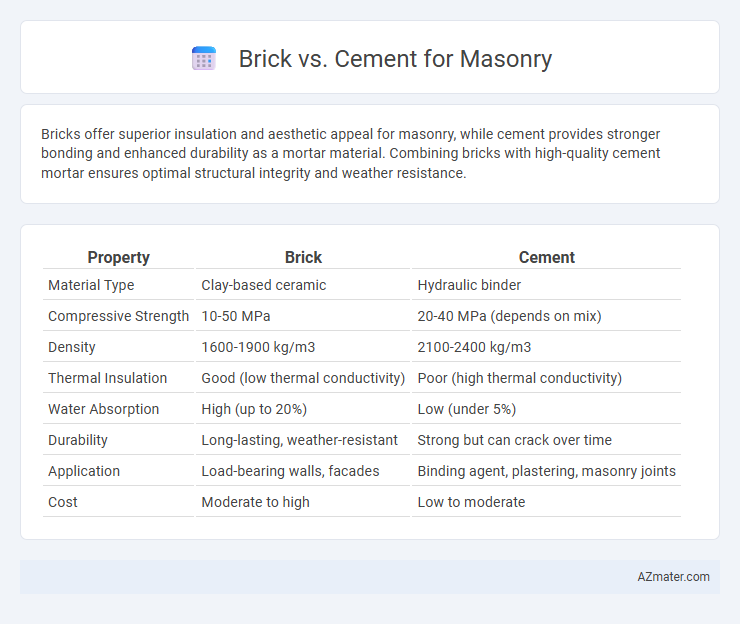Bricks offer superior insulation and aesthetic appeal for masonry, while cement provides stronger bonding and enhanced durability as a mortar material. Combining bricks with high-quality cement mortar ensures optimal structural integrity and weather resistance.
Table of Comparison
| Property | Brick | Cement |
|---|---|---|
| Material Type | Clay-based ceramic | Hydraulic binder |
| Compressive Strength | 10-50 MPa | 20-40 MPa (depends on mix) |
| Density | 1600-1900 kg/m3 | 2100-2400 kg/m3 |
| Thermal Insulation | Good (low thermal conductivity) | Poor (high thermal conductivity) |
| Water Absorption | High (up to 20%) | Low (under 5%) |
| Durability | Long-lasting, weather-resistant | Strong but can crack over time |
| Application | Load-bearing walls, facades | Binding agent, plastering, masonry joints |
| Cost | Moderate to high | Low to moderate |
Introduction to Brick and Cement in Masonry
Brick and cement play crucial roles in masonry construction, with bricks serving as the primary building units made from clay or shale, offering durability and thermal insulation. Cement acts as the binding agent, composed mainly of calcium silicates, which hardens and provides structural cohesion when mixed with water, sand, and aggregates. The combination of bricks and cement mortar defines the strength, stability, and longevity of masonry structures.
Composition and Material Properties
Bricks consist primarily of clay and shale, fired at high temperatures to achieve strength and durability, while cement is a hydraulic binding material composed mainly of limestone, silica, alumina, and iron oxide. Bricks exhibit excellent compressive strength and thermal insulation due to their porous structure, whereas cement provides strong adhesive qualities and sets through hydration, creating a rigid matrix in masonry. The choice between brick and cement impacts the overall structural integrity, thermal performance, and moisture resistance of masonry constructions.
Durability and Strength Comparison
Brick masonry offers superior compressive strength and excellent fire resistance, making it highly durable in various environmental conditions. Cement blocks provide consistent strength and enhanced load-bearing capacity due to their uniform size and composition, often outperforming bricks in structural applications. Both materials require proper maintenance, but cement blocks tend to resist moisture infiltration and cracking better, contributing to longer-lasting masonry structures.
Cost Analysis: Brick vs Cement
Brick masonry typically incurs higher initial costs due to the price of quality bricks and skilled labor required for precise laying, while cement masonry offers a more cost-effective alternative with readily available materials like cement, sand, and aggregates. The long-term maintenance expenses for brick structures may be lower given bricks' durability and resistance to weathering, whereas cement-based masonry may require periodic repairs and resurfacing to address cracking and erosion. Cost analysis must consider local market prices, labor availability, and project scale, with cement often favored for budget-conscious projects and bricks preferred where aesthetic value and longevity justify the investment.
Insulation and Energy Efficiency
Brick offers superior thermal mass, maintaining indoor temperature stability and reducing heating and cooling costs in masonry construction. Cement blocks provide decent insulation but generally fall short of brick's ability to store and slowly release heat, impacting overall energy efficiency. Utilizing brick in masonry walls enhances energy savings by minimizing temperature fluctuations and improving insulation performance.
Construction Process and Labor Requirements
Brick masonry involves laying individual bricks with mortar, requiring skilled masons to ensure proper alignment, bonding, and curing, which can extend labor time due to detailed craftsmanship. Cement masonry, often used for concrete blocks or poured forms, allows faster application with less intricate positioning, reducing labor intensity and accelerating the construction timeline. The choice between brick and cement significantly impacts project schedules and labor costs, as brick demands precision, while cement methods favor efficiency and scalability.
Aesthetic Appeal and Design Versatility
Brick offers a rich variety of colors, textures, and patterns that enhance the aesthetic appeal and allow for intricate design possibilities in masonry projects. Cement blocks provide a more uniform and modern look, which can be customized with coatings or finishes for versatile architectural styles. The choice between brick and cement depends on desired visual impact, with brick favoring traditional warmth and cement enabling sleek, contemporary design flexibility.
Environmental Impact and Sustainability
Bricks, made primarily from natural clay and often fired in kilns, generally have a higher embodied energy compared to cement, due to the energy-intensive firing process. Cement production is a major contributor to CO2 emissions, accounting for about 8% of global emissions, making it less environmentally friendly than traditional brick masonry when used extensively. Sustainable masonry practices increasingly favor bricks with recycled content and alternative fuels in manufacturing, while innovations in low-carbon cement types aim to reduce the environmental impact of concrete construction.
Maintenance and Longevity
Bricks offer superior durability and require less maintenance over time compared to cement blocks, as they resist weathering, cracking, and moisture effectively. Cement masonry units may need regular sealing and repairs due to their porous nature, leading to higher maintenance costs. The long lifespan of brick walls, often exceeding 100 years, makes them a cost-effective choice for longevity in masonry construction.
Choosing the Right Material for Your Project
When selecting between brick and cement for masonry, consider factors such as durability, aesthetic appeal, and thermal insulation properties. Bricks offer superior natural insulation and a classic appearance, ideal for residential facades, while cement blocks provide higher compressive strength and cost efficiency for structural foundations. Assess the specific requirements of your project, including load-bearing capacity and environmental conditions, to choose the optimal material that balances performance and budget.

Infographic: Brick vs Cement for Masonry
 azmater.com
azmater.com